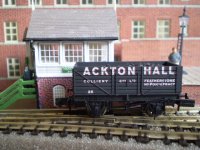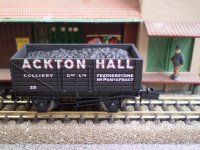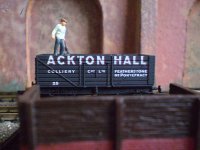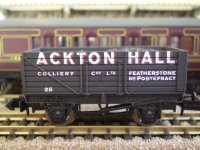Railways were born in the North of England during the Industrial Revolution of the mid
nineteenth century, created to solve the colliery-owners' problem of how to
transport coal to the customer quickly and economically. Horse-drawn wagons took
forever to get anywhere on the dirt-track roads of the day, and then as now, time
was money. The new-fangled canal system, hewn across the country at vast
expense, offered an improvement of a kind, but the barges were still small and
painfully slow. Then along came the iron horse on the iron road, and the modern era
of rapid transport began. Within a few decades the railways became the only way to
move anything to anywhere, and the principal thing which they moved was coal. Every
coal mine had its rail connection and its fleet of wagons, emblazoned with the owner's
name, and every time a wagon carried its load of coal from pit to town it made money
hand-over-fist for the colliery and the railway company. Not much of this money made
its way down to the men who actually dug the coal out, of course, so relations between
the miners and the owners didn't always run smooth. Ackton Hall Colliery was one of
countless pits in the mining heartlands of West Yorkshire, and in the 1890s the whole
area was riven by prolonged and bitter industrial disputes. In the late summer of 1893
the Ackton Hall men were out on strike for better pay and conditions, and on the fateful
day of 7th September things got out of hand. The peaceable protest turned into a riot,
the colliery buildings were burned to the ground, and troops called to restore order were
set upon. In what would subsequently be christened the 'Featherstone Massacre' the
soldiers opened fire on the crowd, leaving two men dead and six others grievously
wounded. Eventually the strike was resolved and the colliery was rebuilt and re-opened,
staying in production until its final closure in 1985, but Ackton Hall's name was always
linked with this grim chapter of British industrial history.
This wagon is produced in association with the Going Loco model shop of Wakefield,
and is also available for purchase from their retail premises in Potovens Lane or from
their stand at exhibitions.
|




